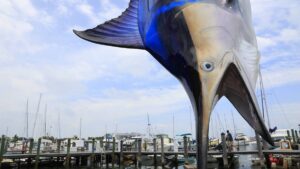Opthea’s done it again: Its drug passed its DME clinical trial

Opthea's drug has passed it's DME clinical trial too
Ten months since Opthea’s (ASX:OPT) drug proved itself against wet-AMD, it’s passed another clinical trial against Diabetic Macular Edema (DME).
This morning the company conducted a 144-patient phase 2a clinical trial against DME, which is a smaller market than wet-AMD, but is similar in that it results in vision loss from fluid leakage in the eye.
It affects about 2 million people globally and there are limited treatment options.
OPT-302, administered by an eye injection, attacks the disease in a similar way to wet-AMD — by blocking multiple vascular endothelial growth factor (VEGFs) rather than just one as current treatments do.
“There is clearly a need for new approaches to address the unmet medical need for DME,” CEO Megan Baldwin said.
“Combination therapies targeting alternative mediators of DME may provide therapeutic benefits as anti VEFG-A mono-therapies do not inhibit all of the factors involved with disease progression.
“As such we have great optimism for OPT-302 to change the treatment paradigm for patients with DME,” Baldwin said.
The results
The mean change in Best Corrected Visual Acuity (BCVA), measured by letters a patient can see on a Snellen chart (the chart of letters you see during an eye exam), after 12 weeks for patients receiving OPT-302 was 5.9 letters, and 52 per cent gained more than five letters.
Although the mean gain in patients receiving Eylea alone was slightly higher at 6.1 letters, a higher portion of patients receiving OPT-302 saw an improvement of over 10 letters and 15 letters.
Twelve per cent of OPT-302 combination patients fell into the latter category, with just 7.5 per cent in the Eylea control group making that cut.
While some patients still lost vision in both groups, OPT-302 had an impact. The percentage of patients who lost five or more letters of vision despite treatment was 2.7 per cent, while just under half of the Eylea patients experienced the same loss (5 per cent).
The drug also showed strong results in a subgroup analysis of patients who had previously received anti-VEGF-A treatment.
The latest trial found OPT-302’s tolerability was consistent with Eylea and there were no observed safety concerns.
The trial is ongoing with some participants yet to make their 24-week follow up. The company anticipates the additional data in the second half of the year.
Shares only rose a modest 3.3 per cent before slipping back, but Opthea is trading well up from its 70c share price in June last year.
Related Topics

UNLOCK INSIGHTS
Discover the untold stories of emerging ASX stocks.
Daily news and expert analysis, it's free to subscribe.
By proceeding, you confirm you understand that we handle personal information in accordance with our Privacy Policy.








